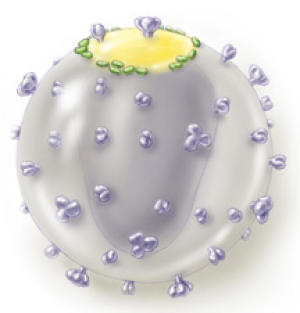
HIV病毒外壳模型的胆固醇组成部分(图中黄色区域)
最近美国霍普金斯大学的科学家们对艾滋病毒进行了一些改造,使它们不能再抑制和逃避人体免疫系统的杀伤。
该研究的论文发表在最新一期的《Blood》杂志上,这项新发现在制造艾滋病疫苗和治疗艾滋病道路上跨过了一道重要的障碍。
分子病理学副教授David Graham博士说道:“HIV病毒能有效抑制人体免疫系统,而不会激活人体免疫反应,这使得艾滋病疫苗的制备异常困难。而我们现在似乎找到了一种方法能跨越这道障碍。”
在通常情况下,人体免疫细胞接触到病毒时,它们会通过释放称为干扰素的化学分子来引发人体内“警报”,提醒各个部位有病毒感染。而当免疫细胞接触到HIV病毒时,它们会释放出过量的干扰素,超过人体控制并随后导致体内抗病毒反应“关闭”。
之前有研究已经表明,人体免疫细胞(白细胞)在不含胆固醇的情况下,HIV病毒不能对其进行感染。因为保护HIV病毒基因组的外壳中也富含有胆固醇,所以霍普金斯大学的科学家们设想HIV病毒在缺乏胆固醇的条件下,是否还能对细胞进行感染。
科学家们使用化学方法去除了病毒外壳的胆固醇,然后将正常的HIV病毒和缺乏胆固醇外壳的HIV病毒和人体免疫细胞共同培养,并对细胞反应进行了测试。结果显示,和正常的HIV病毒相比,缺乏胆固醇外壳的HIV无法诱导人体免疫细胞分泌干扰素。
Graham说道:“这种改造后的HIV病毒不再能控制人体免疫系统,相反还会触发固有免疫反应导致他们被清除在人体内。”
下一步,科学家们将测试缺乏胆固醇外壳的HIV能否激活人体的适应性免疫系统反应(一种帮助人体免疫系统记忆之前的病毒感染,并在后续同一种病毒感染条件下使人体免疫系统迅速做出反应)。他们将这两种HIV病毒与人体血液样品共同培养(人体血液样品中含有适应性免疫反应需要的所有细胞种类)。
血液样品中有来自10例HIV阳性的病人和10例未受HIV感染的病人。结果惊奇的发现,这种缺乏胆固醇外壳的HIV病毒能有效的激活人体适应性免疫反应,这为不久的将来开发临床预防艾滋病的疫苗具有重要的意义。(生物探索 Jun)
生物探索推荐英文论文摘要:
Over-activation of plasmacytoid dendritic cell inhibits anti-viral T-cell responses: a model for HIV immunopathogenesis
A delicate balance between immunostimulatory and immunosuppressive signals mediated by dendritic cells (DC) and other antigen-presenting cells (APC) regulates the strength and efficacy of anti-viral T cell responses. The human immunodeficiency virus (HIV) is a potent activator of plasmacytoid DC (pDC). Chronic pDC activation by HIV promotes the pathogenesis of the acquired human immunodeficiency syndrome (AIDS). Cholesterol is pivotal in maintaining HIV envelope integrity and allowing HIV-cell interaction. By depleting envelope-associated cholesterol to different degrees, we generated virions with reduced ability to activate pDC. We found that APC activation was dissociated from the induction of type I interferon (IFN-α/β) and indoleamine 2,3-dioxygenase-mediated immunosuppression in vitro. Extensive cholesterol withdrawal, resulting in partial protein and RNA loss from the virions, rendered HIV a more powerful recall immunogen for stimulating memory CD8 T cell responses in HIV-exposed uninfected individuals. These enhanced responses were dependent on the inability of cholesterol-depleted HIV to induce IFN-α/β.







